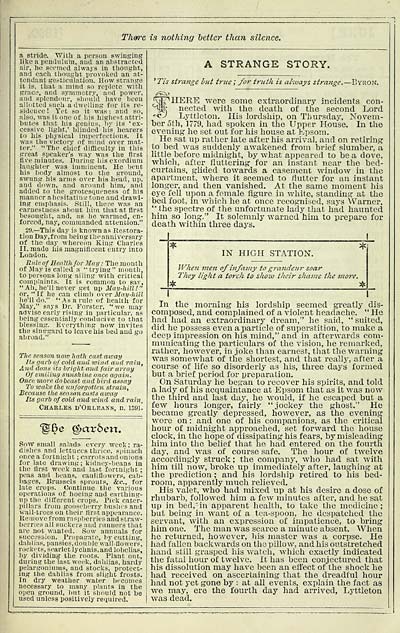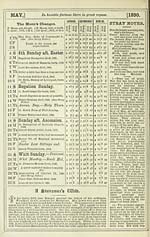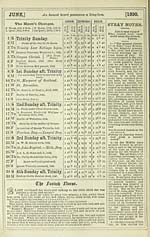Download files
Complete book:
Individual page:
Thumbnail gallery: Grid view | List view

Th&re is nothing better than silence.
a stride. With a person swinging
like a pendulum, and an abstracted
air, he seemed always in thought,
and each thought provoked an at-
tendant gesticulation. How strange
it is, that a mind so replete with
grace, and symmetry, and power,
and splendour, should have been
allotted such a dwelling for its re-
sidence! Yet so it was; and so,
also, was it one of his highest attri-
butes that his genius, by its 'ex-
cessive light.,' blinded his hearers
to his physical imperfections. It
was the victory- of mind over mat-
ter." "The chief difficulty in this
great speaker's way was the first
five minutes. During his exordium
laughter was imminent. He bent
his body almost to the ground,
swung his arms over his head, up,
and down, and around him, and
added to the grotesqueness of his
manner ahesitatins tone and drawl-
ing emphasis. Still, there -was an
earnestness about him that at first
besought, and, as he warmed, en-
forced, nay, commanded attention."
29.— This day is known as Restora-
tion Day, from being the anniversary
of the day whereon King Charles
II. made his magnificent entry into
London.
Bide of Health for May : The month
of May is called a "trying" month,
to persons long ailing with critical
complaints. It is common to say,
"Ah, he'll never get up May-hill!"
or, " If he can climb over May-hill
he'll do." "As a rule of health for
May," says Dr. Forster, "we may
advise early rising in particular, as
being essentially conducive to that
blessing. Everything now invites
the slusgard to leave his bed and go
abroad."
The season now hath cast away
Its garb of cold and wind and rain,
And dons its bright and fair array
Of smiling sunshine once again.
Once more do beast and bird assay
To wake the un forgotten strain,
Because the season casts aioay
Its garb of cold and wind and rain,
Charles d'Orleans, b. 1391.
c &avbert.
Sow small salads every week; ra-
dishes and lettuces thrice, spinach
once a fortnight ; carrots and onions
for late drawing ; kidney-beans in
the first week and last fortnight ;
peas and beans, cauliflowers, cab-
bages, Brussels sprouts, &c, for
late crops. Continue the various
operations of hoeing and earthing-
up the different crops. Pick cater-
pillars from gooseberry bushes and
wall-trees on their first appearance.
Keni ove from raspberries and straw-
berries all suckers and runners that
are not wanted. Sow annuals for
succession. Propagate, by cutting,
dahlias, pansies, double wall-flowers,
rockets, scarlet lychnis, and lobelias,
by dividing the roots. Plant out,
during the last week, dahlias, hardy
pelargoniums, and stocks, protect-
ing the dahlias from slight frosts.
In dry weather water becomes
necessary to many plants in the
open ground, but it should not be
used unless positively required.
A STRANGE STORY.
'Tis strange but true; for truth is always strange. — Byron.
tHERE were some extraordinary incidents con-
nected with the death of the second Lord
~*cJ Lyttleton. His lordship, on Thursday, Novem-
ber 5th, 1779, bad spoken in the Upper House. In the
evening he set out for his house at Epsom.
He sat up rather late after his arrival, and on retiring
to bed was suddenly awakened from brief slumber, a
little before midnight, by what appeared to be a dove,
which, after fluttering for an instant near the bed-
curtains, glided towards a casement window in the
apartment, where it seemed to flutter for an instant
longer, and then vanished. At the same moment his
eye fell upon a female figure in white, standing at the
bed foot, in which he at once recognised, says Warner,
'"the spectre of the unfortunate lady that had haunted
him so long." It solemnly warned him to prepare for
death within three days.
-I
*
IN HIGH STATION.
*
When men of infamy to grandeur soar
TJiey light a torch to show their shame the more.
I
In the morning his lordship seemed greatly dis-
composed, and complained of a violent headache. " He
had had an extraordinary dream," he said, " suited,
did he possess even a particle of superstition, to make a
deep impression on his mind," and in afterwards com-
municating the particulars of the vision, he remarked,
rather, however, in joke than earnest, that the warning
was somewhat of the shortest, and that really, after a
course of life so disorderly as his, three days formed
but a brief period for preparation.
On Saturday he began to recover his spirits, and told
a lady of his acquaintance at Epsom that as it was now
the third and last day, he would, if he escaped but a
few hours longer, fairly "jockey the ghost." He
became greatly depressed, however, as the evening
wore on : and one of his companions, as the critical
hour of midnight approached, set forward the house
clock, in the hope of dissipating his fears, by misleading
him into the belief that he had entered on the fourth
day, and was of course safe. The hour of twelve
accordingly struck ; the company, who had sat with
him till now, broke up immediately after, laughing at
the prediction ; and his lordship retired to his bed-
room, apparently much relieved.
His valet, who had mixed up at his desire a dose of
rhubarb, followed him a few minutes after, and he sat
up in bed," in apparent health, to take the medicine ;
but being in want of a tea-spoon, he despatched the
servant, with an expression of impatience, to bring
him one. The man was scarce a minute absent. When
he returned, however, his master was a corpse. He
had fallen backwards on the pillow, and his outstretched
hand still grasped his watch, which exactly indicated
the fatal hour of twelve. It has been conjectured that
his dissolution may have been an effect of the shock he
had received on ascertaining that the dreadful hour
had not yet gone by : at all events, explain the fact as
we may, ere the fourth day had arrived, Lyttleton
was dead.
a stride. With a person swinging
like a pendulum, and an abstracted
air, he seemed always in thought,
and each thought provoked an at-
tendant gesticulation. How strange
it is, that a mind so replete with
grace, and symmetry, and power,
and splendour, should have been
allotted such a dwelling for its re-
sidence! Yet so it was; and so,
also, was it one of his highest attri-
butes that his genius, by its 'ex-
cessive light.,' blinded his hearers
to his physical imperfections. It
was the victory- of mind over mat-
ter." "The chief difficulty in this
great speaker's way was the first
five minutes. During his exordium
laughter was imminent. He bent
his body almost to the ground,
swung his arms over his head, up,
and down, and around him, and
added to the grotesqueness of his
manner ahesitatins tone and drawl-
ing emphasis. Still, there -was an
earnestness about him that at first
besought, and, as he warmed, en-
forced, nay, commanded attention."
29.— This day is known as Restora-
tion Day, from being the anniversary
of the day whereon King Charles
II. made his magnificent entry into
London.
Bide of Health for May : The month
of May is called a "trying" month,
to persons long ailing with critical
complaints. It is common to say,
"Ah, he'll never get up May-hill!"
or, " If he can climb over May-hill
he'll do." "As a rule of health for
May," says Dr. Forster, "we may
advise early rising in particular, as
being essentially conducive to that
blessing. Everything now invites
the slusgard to leave his bed and go
abroad."
The season now hath cast away
Its garb of cold and wind and rain,
And dons its bright and fair array
Of smiling sunshine once again.
Once more do beast and bird assay
To wake the un forgotten strain,
Because the season casts aioay
Its garb of cold and wind and rain,
Charles d'Orleans, b. 1391.
c &avbert.
Sow small salads every week; ra-
dishes and lettuces thrice, spinach
once a fortnight ; carrots and onions
for late drawing ; kidney-beans in
the first week and last fortnight ;
peas and beans, cauliflowers, cab-
bages, Brussels sprouts, &c, for
late crops. Continue the various
operations of hoeing and earthing-
up the different crops. Pick cater-
pillars from gooseberry bushes and
wall-trees on their first appearance.
Keni ove from raspberries and straw-
berries all suckers and runners that
are not wanted. Sow annuals for
succession. Propagate, by cutting,
dahlias, pansies, double wall-flowers,
rockets, scarlet lychnis, and lobelias,
by dividing the roots. Plant out,
during the last week, dahlias, hardy
pelargoniums, and stocks, protect-
ing the dahlias from slight frosts.
In dry weather water becomes
necessary to many plants in the
open ground, but it should not be
used unless positively required.
A STRANGE STORY.
'Tis strange but true; for truth is always strange. — Byron.
tHERE were some extraordinary incidents con-
nected with the death of the second Lord
~*cJ Lyttleton. His lordship, on Thursday, Novem-
ber 5th, 1779, bad spoken in the Upper House. In the
evening he set out for his house at Epsom.
He sat up rather late after his arrival, and on retiring
to bed was suddenly awakened from brief slumber, a
little before midnight, by what appeared to be a dove,
which, after fluttering for an instant near the bed-
curtains, glided towards a casement window in the
apartment, where it seemed to flutter for an instant
longer, and then vanished. At the same moment his
eye fell upon a female figure in white, standing at the
bed foot, in which he at once recognised, says Warner,
'"the spectre of the unfortunate lady that had haunted
him so long." It solemnly warned him to prepare for
death within three days.
-I
*
IN HIGH STATION.
*
When men of infamy to grandeur soar
TJiey light a torch to show their shame the more.
I
In the morning his lordship seemed greatly dis-
composed, and complained of a violent headache. " He
had had an extraordinary dream," he said, " suited,
did he possess even a particle of superstition, to make a
deep impression on his mind," and in afterwards com-
municating the particulars of the vision, he remarked,
rather, however, in joke than earnest, that the warning
was somewhat of the shortest, and that really, after a
course of life so disorderly as his, three days formed
but a brief period for preparation.
On Saturday he began to recover his spirits, and told
a lady of his acquaintance at Epsom that as it was now
the third and last day, he would, if he escaped but a
few hours longer, fairly "jockey the ghost." He
became greatly depressed, however, as the evening
wore on : and one of his companions, as the critical
hour of midnight approached, set forward the house
clock, in the hope of dissipating his fears, by misleading
him into the belief that he had entered on the fourth
day, and was of course safe. The hour of twelve
accordingly struck ; the company, who had sat with
him till now, broke up immediately after, laughing at
the prediction ; and his lordship retired to his bed-
room, apparently much relieved.
His valet, who had mixed up at his desire a dose of
rhubarb, followed him a few minutes after, and he sat
up in bed," in apparent health, to take the medicine ;
but being in want of a tea-spoon, he despatched the
servant, with an expression of impatience, to bring
him one. The man was scarce a minute absent. When
he returned, however, his master was a corpse. He
had fallen backwards on the pillow, and his outstretched
hand still grasped his watch, which exactly indicated
the fatal hour of twelve. It has been conjectured that
his dissolution may have been an effect of the shock he
had received on ascertaining that the dreadful hour
had not yet gone by : at all events, explain the fact as
we may, ere the fourth day had arrived, Lyttleton
was dead.
Set display mode to: Large image | Transcription
Images and transcriptions on this page, including medium image downloads, may be used under the Creative Commons Attribution 4.0 International Licence unless otherwise stated. ![]()
| Scottish Post Office Directories > Towns > Dalkeith > Carment's … directory for Dalkeith and district > 1890 > (61) |
|---|
| Permanent URL | https://digital.nls.uk/86535506 |
|---|
| Description | Directories of individual Scottish towns and their suburbs. |
|---|
| Description | Around 700 Scottish directories published annually by the Post Office or private publishers between 1773 and 1911. Most of Scotland covered, with a focus on Edinburgh, Glasgow, Dundee and Aberdeen. Most volumes include a general directory (A-Z by surname), street directory (A-Z by street) and trade directory (A-Z by trade). |
|---|


